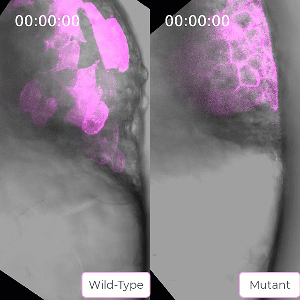CSB Professor Ashley Bruce has received a grant from the Canadian Institutes of Health Research (CIHR) that leverages her knowledge of embryo development to a greater understanding of cancer progression.
Many cancers develop from epithelial cells with cancer progression linked to these cells undergoing an epithelial to mesenchymal transition (EMT). Recent work shows that a partial transition can lead to a tissue state transition from solid to fluid.
Bruce has previously studied epiboly, the process where a solid-like layer of ectoderm cells moves downward around the yolk. With her new grant, she will focus on what happens as the cells fold under themselves in the process known as gastrulation.
During this transition, the cells reverse direction and transition from a more solid tissue to a more fluid tissue with gaps between cells as the ectodermal layer folds under itself to form mesodermal cells that move upward.

Bruce’s student Sirma User, now a postdoc in the lab, has created a zebrafish line carrying a mutation in the ephrin protein. The mutant mesoderm tissue exhibits delays in the solid to fluid shift during internalization. This caused Bruce to reflect on the role of ephrin in tissue state transitions in general which could be relevant to adult tissue during cancer metastasis. Ephrin is seen to be mis-regulated in cancers, leading to a poorer prognosis for the patient.
Bruce and her lab will use their CIHR grant to probe this protein and the ways its activity is regulated in embryo development to gain a better understanding of solid to fluid tissue state transitions, which has implications for understanding similar transitions seen in cancer.
The funds will go to salaries and reagents. One route is to look for protein-protein interactions using the BioID system to find downstream components of the ephrin pathway. As immunofluorescence is technically challenging in zebrafish, the team will use CRISPR to epitope-tag proteins of interest for live imaging and further study.
Bruce is enthusiastic about the University’s process for grant review and grateful to her colleagues for their helpful input that supported her success.
Congratulations, Ashley!
